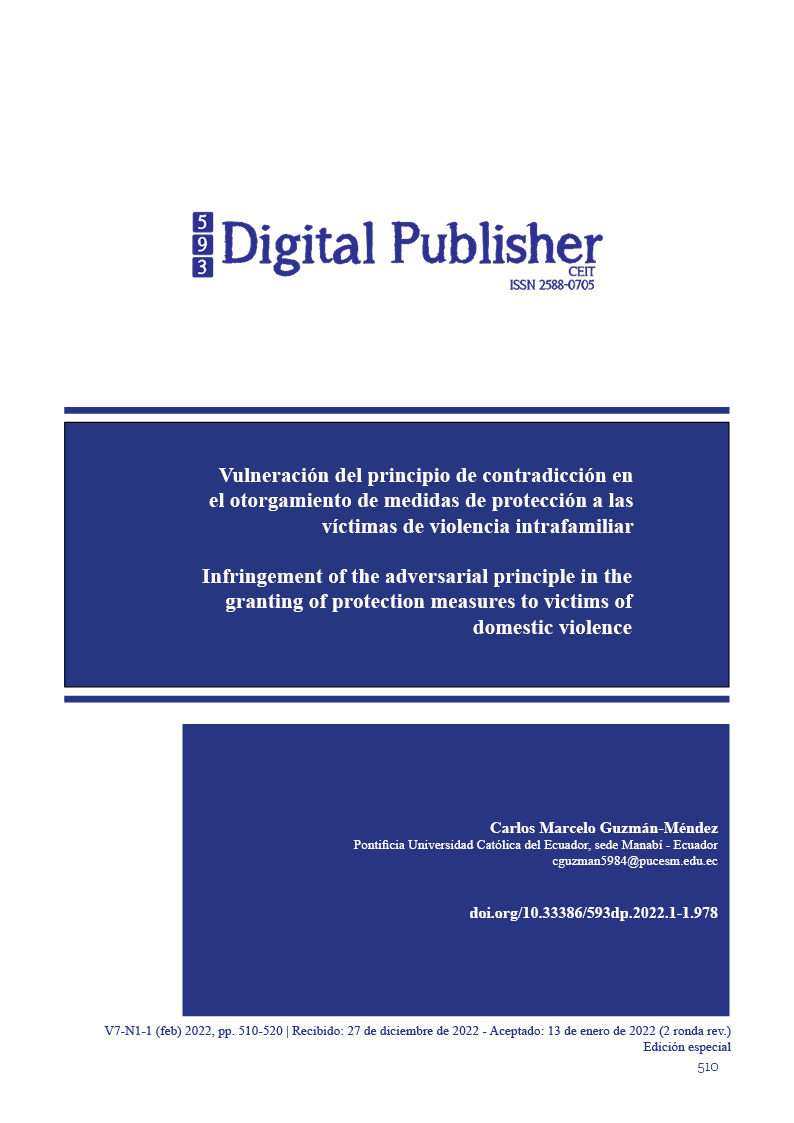Infringement of the adversarial principle in the granting of protection measures to victims of domestic violence.
Main Article Content
Abstract
To ensure and protect the most vulnerable groups, this research work focuses in some way on their identification; find a mechanism to reduce the current high level of domestic violence in Ecuador. Knowledge of legal environment in which women fight domestic violence and the sanctions that can be imposed on perpetrators is essential for society; However, in addition to the sanctions that can be applied to those who attack women, there are other very important aspects to consider; for example, the abuse of protective measures by those who accept them in their favor, and in particular in cases of abuse of the protection provided by law; in such a way that the desire to punish is exceeded and causes a situation in which the excess of precautionary measures causes the man who allegedly committed the aggression to be affected in his right to the presumption of innocence and defense.
Downloads
Article Details

This work is licensed under a Creative Commons Attribution-NonCommercial-ShareAlike 4.0 International License.
1. Derechos de autor
Las obras que se publican en 593 Digital Publisher CEIT están sujetas a los siguientes términos:
1.1. 593 Digital Publisher CEIT, conserva los derechos patrimoniales (copyright) de las obras publicadas, favorece y permite la reutilización de las mismas bajo la licencia Licencia Creative Commons 4.0 de Reconocimiento-NoComercial-CompartirIgual 4.0, por lo cual se pueden copiar, usar, difundir, transmitir y exponer públicamente, siempre que:
1.1.a. Se cite la autoría y fuente original de su publicación (revista, editorial, URL).
1.1.b. No se usen para fines comerciales u onerosos.
1.1.c. Se mencione la existencia y especificaciones de esta licencia de uso.
References
Arendt, H. (2018). Sobre la violencia . Madrid : Alianza Editorial .
Arias, C. (2018). Debido proceso. Madrid: Librimundi.
Arroyo, L. (2014). El derecho desde otra concepción. Bogotá: San Andrés.
Asamblea Nacional . (2014). Código Orgánico Integral Penal. Quito: Ediciones Legales.
Asamblea Nacional. (2008). Constitución de la República del Ecuador. Quito: Corporación de Estudios y Publicaciones.
Ayala, A. (2013). Violencia contra la mujer. Lima: Word world.
Bernal, H. H. (2018). El debido proceso disciplinario. 32.
(2014). Código de la Niñez y Adolescencia.
Código Integral Penal. (2014).
Consejo de la Judicatura. (2020). Rendición de cuentas. Quito: Consejo de la Judicatura.
Counture, L. (2017). La garantia del debido proceso. Bariloche: Mente brillante.
Cueva, A. (2016). El debido proceso. Antioquia: Fandisfa.
Essomba, A. (2014). La igualdad como un concepto. Barcelona: Librimundi.
Hendel, D. (2013). Violencias de género las mentiras del patriarcado. Buenos Aires: PAIDOS.
Herreros, J. (2018). Proteccion a las victimas. Nariño: Mentalidad.
Interamericana, L. C. (1995). Prevenir, Sancionar y Erradicar.
Mejía, A. (2013). Los medios de impugnación ante el proceso y el procedimiento contemporáneo. Quito: Instituto Ecuatoriano de Derecho Procesal.
Ortells, M., & Bellido, R. (2016). Los recursos en el proceso civil. Continuidad y reforma . Madrid : Dykinson, S,L. .
Russell, D. (1993). Making Violence Sexy . Puerto Rico : Teachers College Pr .
Russell, D., & Radford, J. (1992). Femicide: The Politics of Woman Killing . Woodbridge: Twayne Pub .
Sarno, L. (2017). Violencia doméstica contra la mujer: Concepciones y respuestas en América Latina. Buenos Aires: Oligarso.
Vasquez, R. (2015). El Sistema Constitucional. Lima: La Paz.
Zambrano, A. (2015). Proceso penal y garantías constitucionales.
Corporación de Estudios y Publicaciones., 35.


